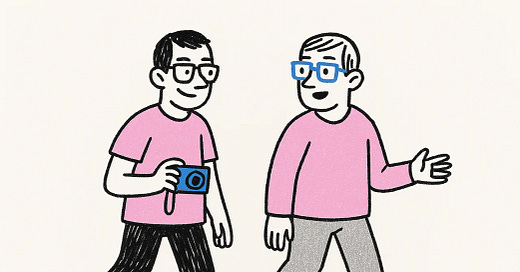Econ: Good Morning, Photographer.
Photog: Good Morning, Economist.
Econ: I have a question for you.
Photog: I am all ears.
Econ: Have you enjoyed going to school?
Photog: Do you want to bring an old trauma back to life?
Econ: I didn't like going to school either. At least most of the time. And I wonder what education would look like in schools today if schools kept pace with today's possibilities. If schools could and would utilise all possible opportunities so that all students could pursue their interests.
Photog: I bet you already have an answer to your questions.
Econ: Take language learning, for example. Today, we can learn any language we want digitally, without being tied to a particular time or place, and affordably. Unless we go to school. My son, for example, is interested in Eastern Europe. He would probably learn a Slavic language in addition to English if he had the choice. He has to choose between French and Spanish.
Photog: This really sounds like something from another time.
Econ: In many ways, today's schools resemble yesterday's schools. Yet they should be schools of and for tomorrow. Where a student can learn a Slavic language, for example, and where such a decision might set the course for an entire life.
Photog: I understand about your son.
Econ: In economics, there's the concept of opportunity cost. It looks at what people don't do because they're doing something else. It's a concept as simple as it is illuminating. Because it draws attention to what is never visible: the unlived life. The potential that hasn't been realised.
Photog: I've heard of opportunity costs before. Probably from you.
Econ: Someone who goes to the cinema in the evening will not see a play. Or they might not go out to eat the next day because they have to save money. In this sense, the net value of going to the cinema decreases when you compare it with the alternatives you haven’t taken. This is generally not a problem, if only because when we make free decisions, then we choose the best option. Economically speaking, the opportunity costs of free decisions are usually less than the benefits of the choice we made. Simply put, if we follow our free will, we will be better off.
Photog: I sense what you're getting at: attending school is often not voluntary.
Econ: With the concept of opportunity costs in mind, the question is less about what someone did and learned during their school years — and then forgot again. Instead, it's about what someone could have experienced and learned during that time if the focus hadn't been on coercion and restriction but rather on the interests of young people. And the school system, above all, was designed to promote those interests.
Photog: I'm starting to think you have the more considerable school trauma of the two of us.
Econ: I can only vaguely imagine such a genuinely free school. The term "school" probably wouldn't even be appropriate for this type of learning. It certainly wouldn't be an institution that generations have associated with "school."
Photog: I get it, Economist. Calm down.
Econ: Such a school life would be fulfilling and happy because people love to learn, are curious, want to know, find explanations, and find their way in the world independently. School should support people in following their dreams.
Photog: It should.
Econ: Moving in this direction has never been easier. Because the opportunities to learn have never been more extensive, accessible, affordable. We just have to take advantage of them.
Photog: You know what, Economist?
Econ: What?
Photog: I discovered my love for photography when I was at school.
Econ: Really? How did that happen?
Photog: At the end of the school year, just before the summer break, there was always a so-called project week. You could choose a project of your choice. One time, I chose photography.
Econ: You learned something for life because you chose the subject voluntarily.
Photog: You are probably right, Economist. See you tomorrow. I'm going to take some photos now.
Econ: See you tomorrow, Photographer. Bring me some interesting ones.




